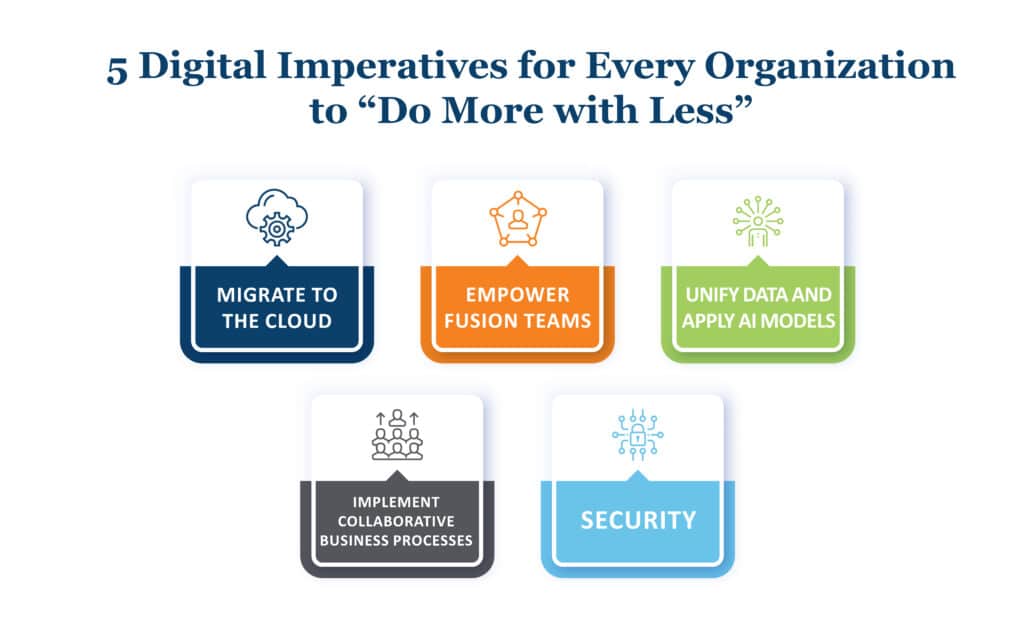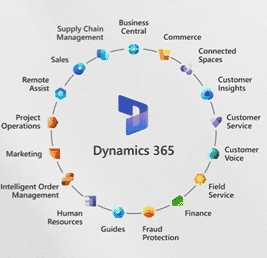The 5 Digital Imperatives for Every Organization to “Do More with Less”
Learn about the five digital imperatives CEO Satya Nadella emphasized during the Microsoft Inspire conference.
Learn about the five digital imperatives CEO Satya Nadella emphasized during the Microsoft Inspire conference.
During the July Microsoft Inspire conference for Microsoft partners, CEO Satya Nadella delivered the keynote address focusing on the theme of companies can “Do More with Less” when it comes to IT initiatives. Along those lines, Nadella emphasized five digital imperatives customers need to achieve:

Nadella also underscored how these five imperatives go beyond digital transformation and may be the difference between companies that thrive and those that get left behind. To do more with less, every organization in every industry needs to infuse technology into every function. That’s because the next 10 years will be different across the business landscape, and technology is the only way to navigate what businesses will face.
By doing more with less, businesses can cut operational costs to avoid raising prices and to retain the resources they need to succeed. But doing more with less does not mean people will no longer work harder. It means applying technology to amplify what the organization can achieve.
Here’s our quick rundown of the five digital imperatives Nadella presented and what they mean for you:
Nadella cited a Gartner report that estimates businesses will deploy 95% of new digital workloads on cloud-native platforms to serve as the foundation to be competitive. Businesses can scale IT resources on demand while also converting their IT spending model from CapEx to OpEX. The cloud also improves the operational efficiency of internal workflows and speeds up the time it takes to deliver new services to customers and internal users.
Within the Microsoft Azure cloud platform, Microsoft found it costs 80% less to run Windows and SQL servers compared to other cloud platforms. Beyond the cost savings, Azure offers unique capabilities to simplify IT management and computability to streamline migrations.
Microsoft also has more data center regions than any other cloud provider and will launch 10 new data center regions in the next year. With 5G compatibility, this expansion will give customer environments faster access to services. All of these capabilities add up to empowering your customers to build applications that can run across on-premises data centers, the edge, and cloud environments.
As defined by Gartner, a fusion team is a multidisciplinary team that blends technology with business domain expertise and shares accountability for business and technology outcomes. Given that every company is a digital company in today’s economy, leveraging or outsourcing to a fusion team is critical.
The challenge is, there’s more demand for developers in some industries than available in the entire tech industry. To help solve this challenge, the Microsoft Power Platform provides the most complete developer platform. This capability is particularly important when considering that Gartner estimates by 2025, 70% of new enterprise applications will be built with low code or no code tools.
With Power Platform, you can do much more for less as both pro and non-technical developers can contribute to accelerating digital capabilities across their organizations. The platform now has 20 million active users, and customers estimate they save 80% in development costs by using the Power Platform.
PG&E presents a classic case pointed out by Nadella. The company saved 75,000 development work hours and expects to save another 645,000 hours with the Power Platform.
Gartner projects that by 2025, 10% of all data will be produced by generative AI models. This illustrates how analytics is becoming a critical component for improving product experiences. Companies need to collect and leverage information on how customers use their products to generate insights on how to improve product performance.
Microsoft is the only company with a complete intelligent data platform to help you gain insights so they can accelerate innovation and achieve agility. On Azure, analytics run nearly 5X faster and cost up to 59% less than other vendors. As a prime example, Walgreens achieved 3X the performance at one-third the cost by using the Microsoft Intelligent Data Platform.
Also consider Ørsted, a Danish multi-national power company They have turned data from offshore wind farms into insights so they can predict issues with their turbines. Ørsted flies drones inside its wind turbines, and with Microsoft intelligence, they can automatically sense any cracks or corrosion. This reduces the number of technicians that need to work on site. In addition to completing inspections faster, the inspections cost less, and it’s a lower safety risk for the technicians.
Hybrid work is here to stay—73% of employees want the flexibility to work remotely, and life balance and their well-being are non-negotiable. With this trend, you need to consider the changes in how people work and how this impacts your business processes.

Automated collaboration is vital in meeting employee workstyle preferences, and you also need digital fabric to connect people, places, and processes. Microsoft helps in this area by providing the only cloud platform that supports everything an organization needs for hybrid work. With Microsoft 365, Dynamics 365, and Teams, you can support all the ways your people work—in one integrated experience that makes work easier and smarter for employees.
More importantly, the Microsoft environment helps you prioritize the employee experience, enabling your team to work wherever they are, which facilitates engagement and retention. Everyone feels included and invested as they have access to all information in one place, which allows them to make decisions faster and do their jobs more efficiently.
Teams is particularly helpful in bridging the gap between people working in-person and remotely. Views in Teams can make it look like everyone is in the same room. With intelligent cameras, individual people in physical rooms are tracked when they’re speaking. This ensures every meeting attendee is an active participant.
These collaborative tools bring together what used to be siloed systems – ERP, CRM, Supply Chain, etc. – into one consolidated platform that provides core functionality along with AI and data insights. In this collaboration first approach, companies can save time and money and structure business processes that connect data, process, and teams, ushering in a new decade of business.
Cybercrime is expected to cost the world $10.5 trillion annually by 2025 so security must be a top priority. At the same time, there are 24 trillion threat signals a day across the globe. How can InfoSec teams deal with all that data?
The Microsoft Cloud helps take on this challenge by bringing together technology and experts to offer the most comprehensive security, identity, compliance, and management solutions possible. The solution works across multiple cloud environments, and customers can expect to save more than 60% in cybersecurity costs on average when they use Microsoft solutions.
One particularly important new ability that Microsoft has launched is encrypting data while it’s in use without changing applications. This quickly safeguards digital assets and will help with compliance for customers in regulated industries.
These five imperatives can provide a framework for your internal strategic discussions about technology at your company. The experts at Velosio can help you to determine where you are in your digital journey and help you build a framework to move toward becoming more efficient and productive with Microsoft technology. Contact our experts today to start your journey to doing more with less.
Talk to us about how Velosio can help you realize business value faster with end-to-end solutions and cloud services.